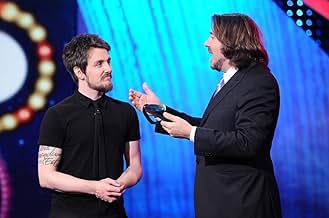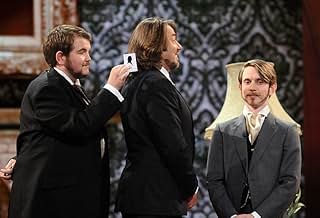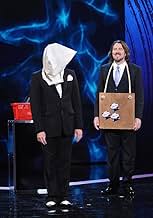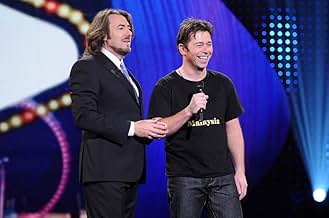Jonathan Ross(I)
- Writer
- Producer
- Actor
Comedian, talk show host, game show host, film critic, radio DJ and
awards show compere, Jonathan Ross is the most successful British
broadcaster of his generation. After attending the School of Slavonic and East European Studies in London and
gaining a Modern European History degree, he worked as a researcher on
Channel Four in the 1980s, becoming a presenter for the first time in
January 1987 on the channel's series
The Last Resort with Jonathan Ross (1987).
Ross made an immediate impression, largely because he didn't base his
presentational style on conventional, comforting and polite British
broadcasters such as Frank Bough,
Michael Parkinson,
Russell Harty,
Alan Whicker and the BBC's main talk show
host of the time, Terry Wogan; his
inspiration was the more fast-witted and irreverent style of American
talk show hosts, in particular
David Letterman.
Although The Last Resort with Jonathan Ross (1987) had a short life, it established him as a major draw for Channel Four and introduced viewers to his trademark irreverent humour and his distinctive speech impediment, which has been the source of plenty of jokes over the years, including a few by Ross himself.
The 1990s were a period of growing success for Jonathan Ross. In 1999 he was chosen by the BBC to replace Barry Norman as the host of Film '72 (1971), their long-running film series on BBC One. The same year he left Virgin Radio to start his popular Radio 2 show, broadcast on Saturdays. In 2001 he landed his own chat show on BBC One, Friday Night with Jonathan Ross (2001).
Further evidence of his status came in 2005, when he was chosen by the BBC to host the corporation's coverage of the Live 8 (2005) rock concerts. Two years later, he was the obvious choice to host the similar Live Earth (2007) for the BBC.
He has been the winner of numerous awards, with Sony judges praising him for his "speed of thought, natural wit, and ability to transform even the most mundane of thoughts into entertaining broadcasting". BBC Director-General Mark Thompson has called him an "outstanding talent", and BBC One Controller Peter Fincham called him a "uniquely talented broadcaster at the very top of his game". He was awarded the OBE for services to broadcasting in 2005.
Ross has not been without his critics. Some have accused him of being the spearhead for a general decline in British television standards since the 1980s, epitomised by his regular use of foul language and blatant sexual references during his late night BBC talk show. He has been at the centre of a number of controversies due to his irreverent style, prompting cautions from The Broadcasting Standards Commission and the BBC's board of governors. Ofcom, the communications regulator, called him "deliberately provocative". John Beyer, director of TV watchdog Mediawatch, has called his language "disgraceful and unacceptable". In 2006, Andrew Neil likened Ross' style to football hooliganism.
Once the bad boy of Channel Four, Jonathan Ross hadn't moderated his style but he became the BBC's most valued broadcaster, with a reputed salary of £6 million a year. In October 2008, Ross caused a major controversy when he left obscene messages with Russell Brand on the answerphone of veteran actor Andrew Sachs while guesting on Brand's Radio 2 show. He was suspended from the BBC for three months and also reprimanded by the BBC Trust over his explicit comments to actress Gwyneth Paltrow on his talk show earlier in the year. In 2009, it was announced that Ross was leaving the BBC in 2010 and in July 2010, the same month his last BBC programme went out, it was announced he had signed a deal to begin a new talk show on ITV1 in 2011.
Although The Last Resort with Jonathan Ross (1987) had a short life, it established him as a major draw for Channel Four and introduced viewers to his trademark irreverent humour and his distinctive speech impediment, which has been the source of plenty of jokes over the years, including a few by Ross himself.
The 1990s were a period of growing success for Jonathan Ross. In 1999 he was chosen by the BBC to replace Barry Norman as the host of Film '72 (1971), their long-running film series on BBC One. The same year he left Virgin Radio to start his popular Radio 2 show, broadcast on Saturdays. In 2001 he landed his own chat show on BBC One, Friday Night with Jonathan Ross (2001).
Further evidence of his status came in 2005, when he was chosen by the BBC to host the corporation's coverage of the Live 8 (2005) rock concerts. Two years later, he was the obvious choice to host the similar Live Earth (2007) for the BBC.
He has been the winner of numerous awards, with Sony judges praising him for his "speed of thought, natural wit, and ability to transform even the most mundane of thoughts into entertaining broadcasting". BBC Director-General Mark Thompson has called him an "outstanding talent", and BBC One Controller Peter Fincham called him a "uniquely talented broadcaster at the very top of his game". He was awarded the OBE for services to broadcasting in 2005.
Ross has not been without his critics. Some have accused him of being the spearhead for a general decline in British television standards since the 1980s, epitomised by his regular use of foul language and blatant sexual references during his late night BBC talk show. He has been at the centre of a number of controversies due to his irreverent style, prompting cautions from The Broadcasting Standards Commission and the BBC's board of governors. Ofcom, the communications regulator, called him "deliberately provocative". John Beyer, director of TV watchdog Mediawatch, has called his language "disgraceful and unacceptable". In 2006, Andrew Neil likened Ross' style to football hooliganism.
Once the bad boy of Channel Four, Jonathan Ross hadn't moderated his style but he became the BBC's most valued broadcaster, with a reputed salary of £6 million a year. In October 2008, Ross caused a major controversy when he left obscene messages with Russell Brand on the answerphone of veteran actor Andrew Sachs while guesting on Brand's Radio 2 show. He was suspended from the BBC for three months and also reprimanded by the BBC Trust over his explicit comments to actress Gwyneth Paltrow on his talk show earlier in the year. In 2009, it was announced that Ross was leaving the BBC in 2010 and in July 2010, the same month his last BBC programme went out, it was announced he had signed a deal to begin a new talk show on ITV1 in 2011.
















































